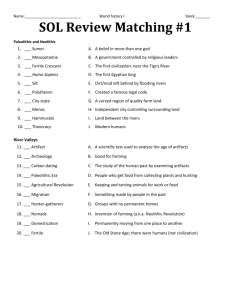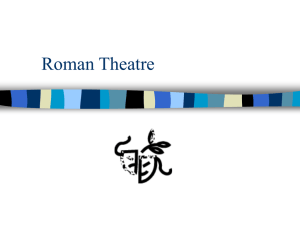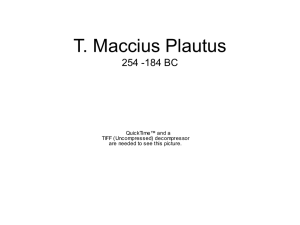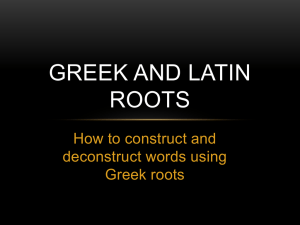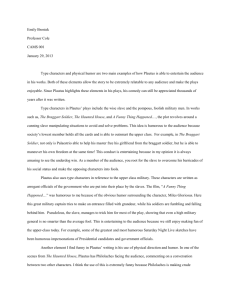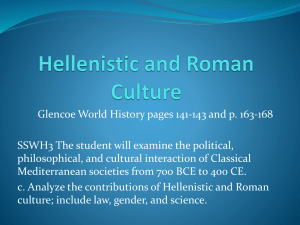Roman Society in the 3rd/2nd Centuries
advertisement
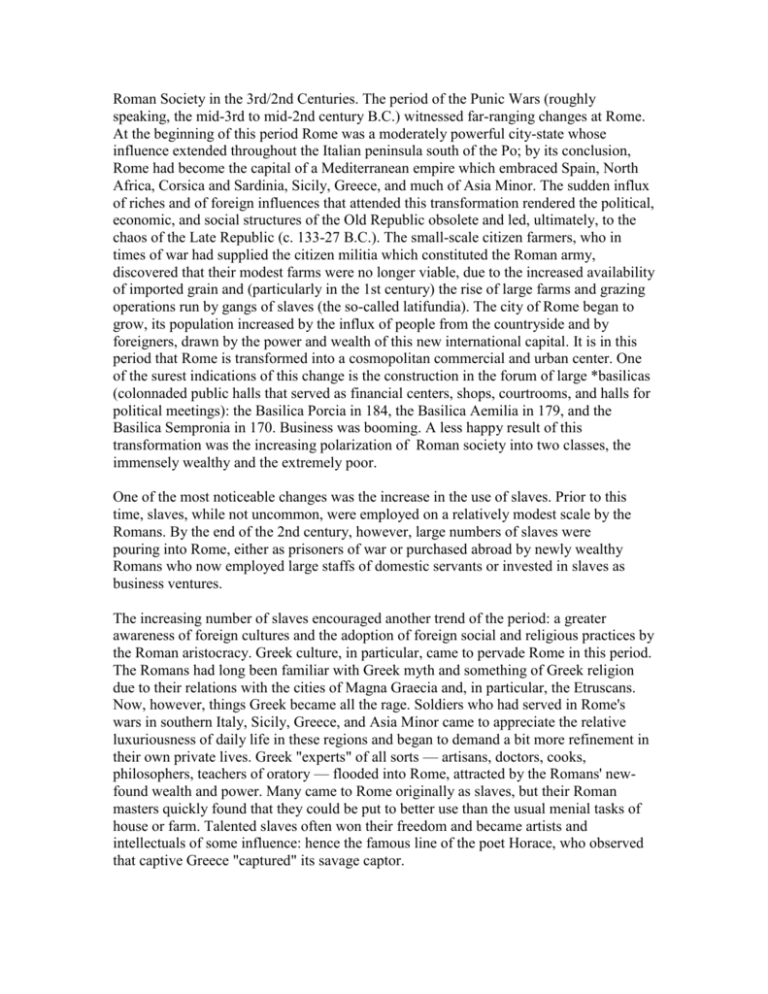
Roman Society in the 3rd/2nd Centuries. The period of the Punic Wars (roughly speaking, the mid-3rd to mid-2nd century B.C.) witnessed far-ranging changes at Rome. At the beginning of this period Rome was a moderately powerful city-state whose influence extended throughout the Italian peninsula south of the Po; by its conclusion, Rome had become the capital of a Mediterranean empire which embraced Spain, North Africa, Corsica and Sardinia, Sicily, Greece, and much of Asia Minor. The sudden influx of riches and of foreign influences that attended this transformation rendered the political, economic, and social structures of the Old Republic obsolete and led, ultimately, to the chaos of the Late Republic (c. 133-27 B.C.). The small-scale citizen farmers, who in times of war had supplied the citizen militia which constituted the Roman army, discovered that their modest farms were no longer viable, due to the increased availability of imported grain and (particularly in the 1st century) the rise of large farms and grazing operations run by gangs of slaves (the so-called latifundia). The city of Rome began to grow, its population increased by the influx of people from the countryside and by foreigners, drawn by the power and wealth of this new international capital. It is in this period that Rome is transformed into a cosmopolitan commercial and urban center. One of the surest indications of this change is the construction in the forum of large *basilicas (colonnaded public halls that served as financial centers, shops, courtrooms, and halls for political meetings): the Basilica Porcia in 184, the Basilica Aemilia in 179, and the Basilica Sempronia in 170. Business was booming. A less happy result of this transformation was the increasing polarization of Roman society into two classes, the immensely wealthy and the extremely poor. One of the most noticeable changes was the increase in the use of slaves. Prior to this time, slaves, while not uncommon, were employed on a relatively modest scale by the Romans. By the end of the 2nd century, however, large numbers of slaves were pouring into Rome, either as prisoners of war or purchased abroad by newly wealthy Romans who now employed large staffs of domestic servants or invested in slaves as business ventures. The increasing number of slaves encouraged another trend of the period: a greater awareness of foreign cultures and the adoption of foreign social and religious practices by the Roman aristocracy. Greek culture, in particular, came to pervade Rome in this period. The Romans had long been familiar with Greek myth and something of Greek religion due to their relations with the cities of Magna Graecia and, in particular, the Etruscans. Now, however, things Greek became all the rage. Soldiers who had served in Rome's wars in southern Italy, Sicily, Greece, and Asia Minor came to appreciate the relative luxuriousness of daily life in these regions and began to demand a bit more refinement in their own private lives. Greek "experts" of all sorts — artisans, doctors, cooks, philosophers, teachers of oratory — flooded into Rome, attracted by the Romans' newfound wealth and power. Many came to Rome originally as slaves, but their Roman masters quickly found that they could be put to better use than the usual menial tasks of house or farm. Talented slaves often won their freedom and became artists and intellectuals of some influence: hence the famous line of the poet Horace, who observed that captive Greece "captured" its savage captor. Many Romans, ever ready to copy the more developed peoples with which they came into contact, went "Greek." Greek art began to be collected on a large scale, either the real thing (brought to Rome as booty) or copies. (Much of our knowledge of Greek sculpture derives from the Roman taste for "knock-offs" of famous Greek originals.) In their private lives wealthy Romans in particular adopted a number of Greek practices: they now went clean shaven, ate bread instead of porridge, modified the traditional design of their houses to include a "Greek" addition in the rear, hired gourmet cooks and purchased elaborate dinner services, used to put on lavish dinner/drinking parties in the Greek fashion (known as symposia) where entertainment of various sorts — literary, musical, dramatic, gymnastic — would be provided by hired professionals. TO TOP OF THIS PAGE Early Roman Literature. Most revolutionary, however, was the influence on Roman literature. Native Italian literary traditions prior to this time were meager to say the least. We know of a small body of poetry (mostly religious hymns) composed in a very loose native meter known as *Saturnian verse (similar, it seems, to the meter of Anglo-Saxon epic). We also hear of another type of religious verse (perhaps Etruscan in origin): mocking, often obscene, largely improvisational poems known as *Fescennine verses that were chanted at harvest festivals and at the triumphs of victorious generals. (Such verses are common on occasions where there is a desire to keep off spirits of blight or disease: these spirits, it seems, are prudes and cannot stand boisterous, rowdy displays of health and vitality.) Finally, we hear of a rude improvisational comedy, known as *Atellan farce, similar to the later Italian commedia dell' arte. This appears to have been Oscan in origin and consisted of very loose scripts that presented stock characters (e.g., Maccus the fool, Bucco the glutton/braggart, Pappus the foolish/crotchety old man, Dossennus the cunning rogue) in stereotypical situations, with lots of slapstick and improvisational humor. In our period, however, Greek literature and Greek literary forms became all the rage among cultured Romans. The process is said to have begun with *Livius Andronicus, who came to Rome as a slave from Tarentum (probably c. 272 in the aftermath of the uprising led by the Greek general Pyrrhus). Andronicus produced a Latin translation of Homer's Odyssey in Saturnian verse. Later he translated Greek tragedy (his first production was in 240), comedy, and other literary forms. Thus the Latin literary tradition begins with an ex-slave from Magna Graecia who translates Greek originals into a form that can be appreciated by his Roman patrons. There soon arose a number of authors, most of them not originally from Rome, who produced works in Latin that imitated or loosely translated the great works of Greek authors. Naevius (born in Capua [again, a region with strong Greek contacts] and active in theater c. 235) composed tragedy, comedy, and epic. His major work, The Punic War, was an epic in Saturnian verse — like Andronicus' Odyssey — but this time on a Roman theme: Rome's glorious victory over Carthage in the First Punic War. (The practice of writing epics celebrating the military exploits of important individuals had been common in Greek since the Hellenistic Age.) At the end of the second century appeared the most important figure in the early history of Latin literature: the poet *Ennius (c. 234-169), from Calabria (again, note the connection with Magna Graecia), brought to Rome from Sicily by Cato the Censor in 204. Ennius is credited with an immense variety of works (tragedy, comedy, satires, etc.) only the barest fragments of which survive. His most famous work was the Annals, a lengthy epic that celebrated Rome's history from Aeneas' time to the end of the Second Punic War. Rather than Saturnian meter, however, Ennius employed a Latin form of the dactylic hexameter used in Greek epic: now not only were the genre and the general style of Roman epic Greek, but the very meter in which it was composed was Greek, an indication of the increasing refinement of the Roman poets and their audience. Thus for many aristocratic Romans, things Greek became all the rage. This philhellenic tendency was associated above all with the dashing, young *Publius Cornelius Scipio Aemilianus (185/4-129), the son of L. Aemilius Paullus (hero of the Third Macedonian War, who had brought the library of King Perseus to Rome). [FN 1] Through his wealth and influence Scipio was able to gather about him a coterie of prominent writers and thinkers who became known as the *Scipionic Circle. The most notable members of this group were *Terence, *Polybius (a Greek aristocrat from Megalopolis who came to Rome as a hostage and became a noted historian), Panaetius (from Rhodes, an important figure in the history of Stoicism), and Lucilius (from Campania, who perfected the genre of Roman satire). On other hand, among many Roman traditionalists there arose a conservative backlash. These people resented the overturning of Roman traditions and, in particular, traditional Roman morality, which they felt was threatened by increasing signs of luxury and sloth. Roman aristocrats like Scipio seemed to care more for books, art, and fine dining than farming, military glory, or politics — the traditional concerns of the Roman nobility. Moreover, the ideas bandied about by the philhellenic crowd were troubling: many seemed to challenge the dominance of the patrician class by preaching the equality of all humankind; others (e.g., the Epicureans) called into question traditional religious beliefs and practices or rejected traditional views of the relationship between the individual and the state. Prominent among those who opposed the adoption of Greek practices was *Marcus Porcius Cato (234-149), also known as Cato the Elder or Cato the Censor. Plautus' plays give us some insight into the negative stereotypes of Greeks and Greek culture in the late third/early second century B.C. Characters in his plays frequently use the phrase "to live like Greeks" in reference to a life of drinking, gambling, fine dining, illicit sex, and general lounging about. On one occasion (Curculio 288-95) Plautus even achieves something of the tone of Juvenal: the parasite Curculio comes dashing onto the stage in a desperate hurry and offers a "running" commentary (so to speak) on all of the people in the crowded street who are in danger of being bowled over should they block his way. Among them are Greeks, who are presented as crooks and frauds who play up their learning and culture but live by toadying and theft: Then there are those Greeks, who stroll about in their foreign little cloaks, their heads all muffled up, their garments stuffed full of books — and of handouts from wealthy patrons! They stand about, chatting in groups with one another, the no good runaways! They block your path, always in the way, as they promenade about with their fancy philosophical sayings. You see them all the time drinking in the wine stands (whenever they've managed to filch some cash, that is): their heads still cloaked, they toss down their warmed wine and then march along, so serious looking — and so drunk! If I bump into any of them, I'll knock a barley-groat fart out of each and every one of them! At this point you should read Plautus' Brothers Menaechmus. TO TOP OF THIS PAGE Plautus, Terence, and Roman New Comedy. Virtually all of the literature that survives from this period, however, (with the exception of a work on agriculture written by Cato) are the plays of Plautus and Terence, whose comedies present loose adaptations of original works by Athenian playwrights of the 4th/3rd century. [Such adaptations were known as fabulae palliatae ["comedies in Greek dress"] to distinguish them from the fabulae togatae ["comedies in Roman dress"]: the former preserved the settings and characters of their Greek models, whereas the latter presented original plots involving Roman characters in a Roman setting. It is easy to understand why the fabulae palliatae were more popular: the Romans were quite ready to laugh at a bunch of foolish Greeks, but would not have been so comfortable at seeing Roman characters engage in such antics.] Plautus and Terence compose what are known as *New Comedies. The term New Comedy is used to distinguish the type of comedies composed by the playwrights of 4th/3rd century Athens from the *Old Comedy of 5th century Athens (represented for us by the 11 surviving plays of *Aristophanes, which date to the period 425-c. 388 B.C.). Old Comedy presented a fantasy-laden, bawdy, highly topical form of humor: a combination, if you will, of Monty Python, Saturday Night Live, and Lenny Bruce. [For example, in one of Aristophanes' plays the comic hero, who protests against the on-going war with Sparta, flies up to heaven on the back of a dung beetle (the latter having been force-fed mounds of dung in order to increase its size) and rescues the goddess Peace. In another, the women of Greece decide to end the war by going on a sex- strike: here, the fact that all of the male actors wore long phony leather phalluses (penises) is used to good effect to demonstrate the men's "distress."] Throughout, Aristophanes' plays are laden with personal attacks against prominent politicians, generals, philosophers, artists, poets, and other well-known personalities of the day. In the course of the 4th century, however, Athenian comedy underwent a radical transformation. With the rise of Macedon and the reduction of Athens and the other Greek city states to political and military backwaters, the confidence and sense of selfidentity displayed by Aristophanes' plays began to wane. Comedy turned from the highly confrontational, topical humor of Aristophanes to mythological burlesque (mock reenactments of famous myths) and what we today refer to as comedy of manners. This latter form of comedy is what we today call New Comedy. Its most famous practitioner was the playwright *Menander, whose works date from 321 to c. 292 B.C. Menander's plays deal with humorous domestic situations —troubles between husbands and wives or, in particular, fathers and sons — that are used to present genial, mildly philosophical reflections on the human comedy. Menander is said to have been a student of the philosopher *Theophrastus (*Aristotle's successor). He shows a keen interest in human character, particularly as it is revealed in an individual's moral choices. Frequently in Menander we find essentially decent people who are placed in a difficult situation through their own failings and must make difficult decisions. Generally speaking their dilemmas lead, as well, to reflections on various features of Athenian society or Athenian attitudes. [In one play, for example, a young newly-wed husband finds out that his wife is already pregnant, having been raped by an unidentified assailant at a religious festival a few months before their wedding. Distraught at his wife's condition, he deserts he and moves in with a prostitute next door. In the course of the play he discovers that he himself was his wife's rapist and, in addition, overhears his wife defend him passionately against her father's opposition. In the play's climactic scene the agonized husband is forced to confront both the double standard by which he has been living and his lack of compassion for his wife, who has proven herself so utterly loyal to him.] Such comedies are not played for belly laughs; they are generally quiet, sedate, and, although composed in verse, prosaic in tone. TO TOP OF THIS PAGE Plautus (c. 254-184) came from Umbria. In contrast to the works of Menander, Plautus' plays are rowdy, raucous, and fast-paced, with a clear preference for slapstick and farce over organic, carefully developed plots, characters, or themes. Rather than social commentary or sympathetic studies of the human comedy, Plautus' works aim above all for variety and motion. Thus you will discover that Plautus' plays are generally much busier those of Menander, with characters constantly running on and of stage and frequent scene changes. Slapstick scenes abound, as do scenes of verbal slapstick (puns, jokes, stand-up routines, comic patter speeches — often lost in translation). Where Menander's sedate comedies are composed predominately in spoken iambic trimeter (with some passages in the somewhat more agitated trochaic tetrameter, in which the actors chanted their lines to musical accompaniment), only 38% of the lines of Plautus are composed in spoken meters, the rest being in chanted or, often, lyric meters. The meters of Plautus' plays are constantly shifting, either to indicate changes in mood or simply for the sake of variety. [FN 2] (Particularly notable are Plautus' comic arias or cantica — elaborate, witty songs that are effaced in translation.) His stage is constantly in motion, presenting the color, wit, action, and variety of a music hall comedy. To understand why it is that Plautus, in adapting his Greek originals, arrives at a type of comedy so different in style and tone from that of Menander, you need to consider the conditions under which his plays were performed and the general differences that distinguish the Roman view of theater from that of the Greeks. At Athens and elsewhere in Greece, plays — both tragedies and comedies — were produced as part of an august religious/civic occasion such as the City Dionysia (an elaborate festival in honor of the god Dionysus) and were staged in large permanent theaters that were designed to hold a significant portion of the citizen body. These occasions served as cultural showcases — an opportunity for the polis (or city-state) to express the values and ideals that made it great. The citizens gathered in the theater could be viewed as an extension of the ecclesia (the democratic assembly of all citizens) which gathered on the Pnyx to determine Athenian policy. The plays themselves were felt both to express the spirit of the polis and to enrich the audience in so doing: drama was viewed as a part of the paideia or education of the citizenry. This accounts, in part, for the tendency of 5th-century tragedy and comedy to address issues of concern to the polis. Menander's comedies are true to this tradition, reflecting the new philosophical, ethical, and social concerns of individual Athenians in the late 4th century. In Rome conditions were quite different. The plays were performed at *ludi ("games"). These ludi were put on as part of a religious festival or similar public occasion, but unlike, e.g., the City Dionysia, they were viewed as mere popular entertainment for the mob and had little of the civic element that informs Athenian drama. The principal annual festivals at which ludi were held are listed below, with the time of year, the name of the presiding official, the god in whose honor the games were held, and the date they were first instituted: Ludi Romani (Sept. — Curule Aediles — Jupiter Optimus Maximus — 364) Ludi Plebeii (Nov. — Plebeian Aediles — Jupiter — c. 220) Ludi Apollinares (July — Praetor Urbanus — Apollo — 212) Ludi Megalenses (April — Curule Aediles — Great Mother — 194) [FN 3] Rather than being the centerpiece of such occasions, plays provided merely one form of available entertainment: chariot races, gladiatorial contests, jugglers, acrobats, boxers, and other diversions were also available for the crowd's delight. In general, the atmosphere appears to have been rather like that of the modern country fair. The Roman nobility viewed such spectacles as a way of placating the mob: the ludi lacked the dignity and gravity for which they themselves strove, but they did provide a useful means for those nobiles with political ambitions to curry the mob's favor. Combined with the nobility's contempt was an element of uneasiness and distrust at the thought of the plebs gathering in such numbers: at Athens, gatherings in the theater recalled meetings of the ecclesia on the Pnyx; at Rome, on the other hand, such gatherings recalled the secessions of the plebs or the often incendiary meetings of the concilium plebis under the leadership of the tribunes, both of which represented potential challenges to the authority of the nobiles. Thus, in contrast to Athens, we find no permanent theater in Rome until that built by Pompey the Great in 55 B.C. (significantly, during his second consulship, at a time when he was vying with Caesar for popular influence); in Plautus' and Terence's time the plays were performed on temporary wooden stages before audiences who either stood or sat on bleachers. To get a sense of the rowdy disorder and carnival-like atmosphere of the ludi, read the prologue to Terence's Hecyra (pp. 293-94 in Radice's translation), where the poet describes the failure of the play on the first two occasions it was presented. Plautus is clearly writing with such an atmosphere and such an audience in mind: his fastpaced, boisterous plays are designed to attract and keep the audience's attention; his broad humor and simple plots do not require careful attention and can survive the sorts of distractions that proved fatal to Terence's plays. Moreover, in adapting his Greek originals Plautus injects elements that will be familiar to his audience: his stock characters and loose plots, the use of slapstick and song seem designed to incorporate elements of Atellan farce into the matrix provided by Plautus' Greek originals. To this end, Plautus is very selective in his choice of Greek models, tending to eschew the quiet, "ethical" plays of Menander in favor of the rowdier works of authors such as Diphilus. Plautus is quite creative in his adaptation of his Greek originals. In many ways his boisterous, wildly inventive comedies are much closer to Aristophanic theater than are the plays of either Menander or Terence. Unfortunately, much of Plautus' artistry disappears in translation. English readers, unable to appreciate Plautus' use of language and meter, often dismiss him as primitive, quite unjustly. Plautus is above all a playwright of the stage: to read him on the page (especially in translation) is to strip him of the very resources that brought his plays to life, rather like reading the script of a modern musical. Read Plautus' Pseudolus. TO TOP OF THIS PAGE Terence. [Read the introduction to Radice's translation.] Terence's dates (c. 190/85-159) place him approximately a generation after Plautus. He is quite different from Plautus in his approach to New Comedy. Terence is much closer in spirit to Menander, to whom he regularly turns for his Greek model. His works are more sedate and refined, presenting a gentle comedy of manners with an emphasis on character and on ethical/social themes. Like Menander, his plays are very prosaic: 52% of his lines are composed in spoken meters and there are few songs. Slapstick — either verbal or physical — is also much reduced. As opposed to Plautus' various stand-up routines and comic shticks, Terence presents an organic plot and relatively realistic situations. Unlike Plautus' two-dimensional comic figures, Terence's stock characters are fleshed out: as in Menander, we are presented with characters who are confronted with difficult ethical choices and whose plights, while humorous, are regarded with a humane sympathy and seriousness. As Radice indicates, these differences can be attributed in part to a greater degree of sophistication in the literary tastes of Terence's generation (his 6 surviving plays were produced in the years 166-160, some 20 years after Plautus' death), in part to his association with the Scipionic Circle. They also account for Terence's conspicuous lack of success in his own day. (Significantly, his reputation grew in later generations, largely among a reading audience.) Terence's prologues. Terence breaks from tradition by employing his prologues to address issues that concern him as an artist, leaving his characters to introduce the necessary background to his plot. These prologues provide us with interesting glimpses into the professional life of a comic playwright in mid-second century Rome (when it seems that competition for the right to perform was intense) and into the curious aesthetics by which the author's adaptation of his Greek originals was judged. Most notable in this regard is the dispute over Terence's practice of contaminatio — his insertion of discrete scenes from one Greek original into his Latin adaptation of another Greek play. In his later plays there is some evidence that Terence employed contaminatio to enliven the plot of his otherwise sedate comedies. (In Brothers, for example, he inserts a mildly slapstick and utterly gratuitous scene of a pimp being beaten up and mocked.) On the whole, however, he seems to have done this in order to generate the double plots for which he is so well known, wherein he presents two separate but related story-lines. In his early plays this double plot is often more confusing than enlightening, generating a story of such complexity that it is difficult to follow even in the study, much less amidst Rome's ludi; his more mature works employ this device in more interesting ways, anticipating later Elizabethan drama. Read the prologues to Terence's six surviving plays, then read The Girl from Andros and The Brothers. [FN 1] For more on Scipio Aemilianus see the introduction to Radice's translation of Terence. [Return to text] [FN 2] For a more detailed discussion, see T.J. Moore, "Music and Structure in Roman Comedy" (AJP 119 [1998] 245-73). [Return to text] [FN 3] Ludi would also be held at the funerals of important public figures (ludi funebres) and at the triumphs of Roman generals. [Return to text] Top of Page : Course Notes Page : CNEA Home Page
